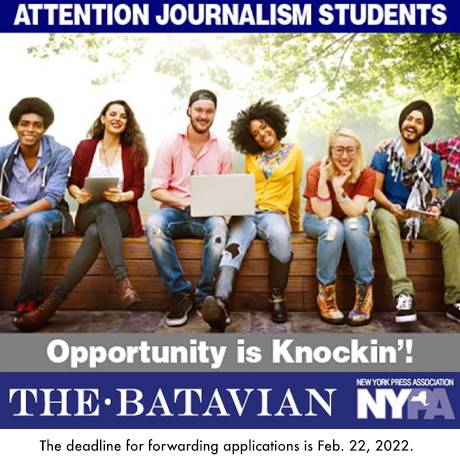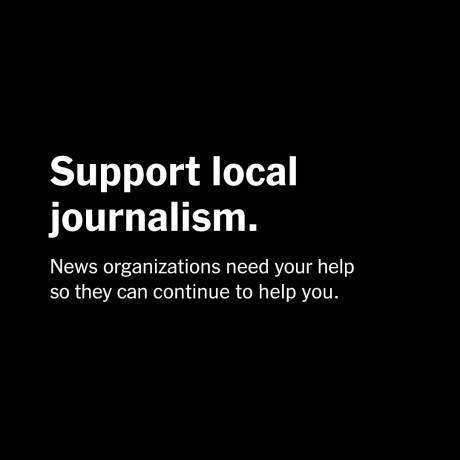For 17 years, Tom Rivers soldiered on in small-town, print journalism, honing his craft writing about pinewood derbies, high-school graduations and new varieties of cucumbers.
All that changed over the past 30 days. After 15 years at the Batavia Daily News, he quit. He quit to become an online news journalist in Orleans County. OrleansHub.com officially launched today.
Rivers did it, in part, because, "it seemed like the county would benefit from having a locally owned, locally run news site."
It's a big step and an unusual one, to go from a steady job at a daily newspaper to a locally owned, online-only news start-up. (There are nearly 100 successful locally owned online community news sites in the nation, and perhaps without exception, all founded by out-of-work journalists who started their ventures as much out of necessity as passion).
Rivers has the passion, but he also has the financial backing many locally owned start-ups lack.
Karen Sawicz, owner of the Lake County PennySaver, is providing the resources necessary to get OrleansHub off the ground.
While Rivers is the editor, reporter, photographer and public face of OrleansHub, the PennySaver is supplying technical, advertising and back-office support and Sawicz is paying his salary until online advertising revenue can carry the site on its own.
The 38-year-old journalist, who is married with four children, said he couldn't have carried out the vision for OrleansHub without Sawicz's support.
It's clear Rivers admires Sawicz. They're both Rotary Club members and have known each other for years.
"One of the things I liked about her is she's in charge of the hot dog stand at the strawberry festival," Rivers said. "In terms of the thankless job that no one wants, she goes and deals with the health department, gets all the stuff, cleans it up, puts it away. I just thought that showed something. She's also willing to do the heavy lifting. When I first came out here, there were two chambers (of commerce), Albion and Medina, and she was willing to be kind of the leader to bring those two together."
Sawicz's parents purchased the PennySaver in 1960 and she bought it from them in 1989.
Rivers said locally owned businesses in Orleans County have never had a bigger cheerleader than Sawicz.
Sawicz chaffs at the idea of county governments giving out government contracts to non-local businesses and Rivers opposes tax subsidies for national retailers.
They have a mutual passion for Orleans County that brings them together as a publishing team.
They both think existing media outlets weren't giving Orleans County the coverage it deserved.
"There's more that happens in Orleans County than just the bad stuff," Sawicz said. "We want good stuff to be told, too."
Rivers thinks the Daily News does a better job than other news outlets of getting beyond the murders and the weird crimes, but there just wasn't enough news getting published about his home community, he said.
In a way, Rivers is now competing with his former employer, but he is not about to say anything negative about the Daily News. While he acknowledges the newspaper industry as a whole is struggling -- part the reason he wanted to give online-only news a try -- he also thinks small-town papers will survive.
For the Daily News, however, the launch of OrleansHub puts the Johnson family, owners of The Batavia Daily News, the Livingston County News and the Watertown Daily Times, in a unique position.
Where the vast majority of online-only news sites are in urban or suburban settings, the Johnson's rural newspapers are likely the only ones in the nation facing competition from multiple start-ups in rural communities.
Besides OrleansHub and The Batavian squaring off against the Batavia Daily News, there is the Genesee Sun in Livingston County and the aggregation site NewzJunky.com in Watertown.
Only time will tell how all that shakes out, but for Rivers, he's just focused on making his new venture a success, and he knows that will take hard work.
And he's OK with that.
"(Being a journalist) is actually a fun job and I wanted to do more, to work more than just 35 hours a week," Rivers said. (Daily News staffers are limited to 35-hour work weeks these days, according to Rivers.)
In his time with the Daily News, Rivers won several statewide writing and reporting awards. He also published a regionally successful book based on his series of articles about working in GLOW-area farm fields called "Farm Hands."
Rivers has a new book out, a collection of his columns written for the Daily News, called "All Ears." Rivers said the book is "a love letter to the Daily News." (For more on Tom's books, click here.)
It also served to close one chapter on the professional career of Tom Rivers and now he's excited about the unlimited possibilities of being online news site owner.
The efficiencies of online publishing means Rivers will be able to produce more news than a print news staff produces and he'll get it published quicker, with more real-time news reports than Orleans County readers will be able to get from any other source.
Rivers is also an avid photographer and is looking forward to publishing more photos with his stories than he could publish in print.
And he's passionate about Orleans County and plans to be an advocate for growth and community pride in the area.
He hopes OrleansHub will energize younger readers to get involved in their community.
"They're not newspaper readers," Rivers said. "They might realize they can get plugged into the community with the history society or youth baseball. As you show them more of the community, they will see more ways to get plugged in, and I think that's what we need to be a viable, vibrant community."
One of the things that gave Rivers the courage to make the leap from being a print employee to an online journalist was covering the ag beat for so many years.
He would see farmers, many in their 50s or 60s, hit hard times or a changing market place and they would totally reinvent their businesses.
He mentioned LynOaken Farms in Lyndonville, which had a thriving Empire apple business that was a century old when storms nearly destroyed the farm. The owners came back from those difficulties to move into heirloom apples and open a winery and become one of Orleans County's agricultural success stories.
"You have to be able to change," Rivers said. "Even though you might be growing the best Empire apples, if they're not paying the bills or if long term that's not the way to do it, you have to switch."
Rivers made the switch and Orleans County is likely to be better off because of it.



